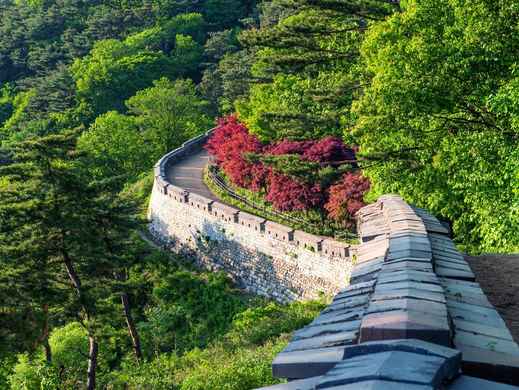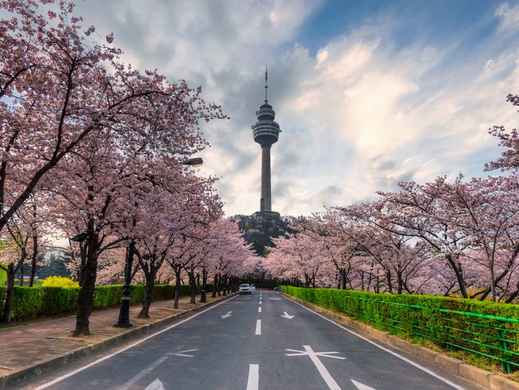


Boseong
Asia
/
South Korea
/
Boseong-gun
Nestled in South Korea's southwestern Jeollanam-do province, Boseong captivates visitors with its undulating emerald-green tea plantations that cascade over gentle hills. The region enjoys a temperate climate with four distinct seasons – cherry blossoms in spring, lush greenery in summer, vibrant foliage in autumn, and occasional light snow in winter. The coastal proximity creates misty mornings that delicately shroud the tea fields, creating a mystical atmosphere beloved by photographers and nature enthusiasts alike.
Life in Boseong moves at a refreshingly unhurried pace compared to Korea's metropolitan centers. Locals embody the traditional Korean values of hospitality and community, with many families having cultivated tea for generations. The agricultural heritage permeates daily life, creating a culture where quality and craftsmanship are valued over mass production. Residents take immense pride in their tea-growing legacy, often eager to share their knowledge with curious visitors.
What makes Boseong truly special is its status as Korea's green tea capital, producing over 40% of the country's green tea. The meticulously maintained Daehan Dawon Tea Plantation, with its perfectly aligned rows of tea bushes, stands as the crown jewel of Korean tea cultivation. Beyond tea, Boseong's position between mountains and sea creates a uniquely diverse ecosystem where visitors can experience both forest bathing and coastal relaxation within the same day.
Tea infuses every aspect of Boseong's culinary scene, appearing in unexpected and delightful forms. Don't miss the green tea bibimbap, where the traditional rice dish is enhanced with tea-infused ingredients, or the refreshing green tea ice cream that provides perfect relief on warm days. For a truly immersive experience, participate in a traditional tea ceremony where you'll learn the proper techniques for brewing and appreciating tea according to centuries-old traditions.
While the Daehan Dawon Tea Plantation rightfully draws most visitors with its Instagram-worthy landscapes, make time for the Boseong Green Tea Museum to understand the fascinating history and production process behind Korea's cherished beverage. For those seeking active adventures, the nearby Boseong River offers serene kayaking opportunities through picturesque countryside, while the coastal Yulpo Beach features unique tea-infused hot springs where you can soak in mineral-rich waters infused with green tea extract – a truly unique Korean wellness experience.

Travel Tips for Boseong
What you need to know before traveling here
Getting Around Boseong
A guide to Boseong's local transportation
If you like the flexibility of exploring the city, then renting a car can be a great option. In Boseong, there are several services that provide cars for rent by tourists with a variety of vehicle options. To rent a car in Boseong easily, you can directly visit the Traveloka application to get affordable prices!
Practical Tips for Boseong
Things to prepare and best way to visit
High-quality loose green tea is the premium souvenir, with first-flush (ujeon) harvested in early spring commanding the highest prices for its delicate flavor. Beyond drinking tea, look for green tea cosmetics, soaps, and skincare products that utilize tea's antioxidant properties. Edible souvenirs include green tea cookies, chocolates, and traditional rice cakes. Tea sets made by local artisans offer both functionality and artistic value as lasting mementos of your visit.
The South Korean won (KRW) is the local currency, with ATMs available in Boseong town but limited in rural areas. Major tea plantations and hotels accept credit cards, but smaller restaurants, markets, and transportation often require cash. Prepare small bills for countryside vendors and taxis. Foreign card-compatible ATMs can be found at the Boseong Agricultural Cooperative Bank and some convenience stores.
Boseong is famous as the "Green Tea Capital of South Korea". The climate and soil conditions in the city provide an optimal environment for the growth of green tea with a distinctive flavor and aroma. Nearly a third of all tea plantations are located in Boseong, and almost half of South Korea's green tea production comes from this region. Boseong is also known as one of the areas with the highest rainfall in South Korea. As the main city for green tea production in South Korea, Boseong is a must-visit destination for green tea enthusiasts.
Late April through May offers perfect weather and vibrant green tea fields during harvest season. This period coincides with the Boseong Green Tea Festival (usually held in May), featuring tea-picking experiences, cultural performances, and special tastings. Autumn (October-November) provides another excellent window with comfortable temperatures and beautiful foliage colors contrasting against the emerald tea plantations.
Within a 30-minute drive, you can visit Yulpo Beach and its unique green tea hot springs. Boseong Cypress Forest offers therapeutic forest bathing along well-maintained trails. History enthusiasts should explore Bongnaesu Village with its traditional architecture and thatched-roof houses. The nearby Boseong Coal Mine Cultural Center provides insight into the region's industrial heritage before tea became its primary identity.
See All Practical Tips for Boseong

Explore Boseong
Create your itinerary with our top picks below

Travel Tips for Boseong

Explore Boseong
More Destination Near Boseong























 Facebook
Facebook Instagram
Instagram TikTok
TikTok Youtube
Youtube Telegram
Telegram
